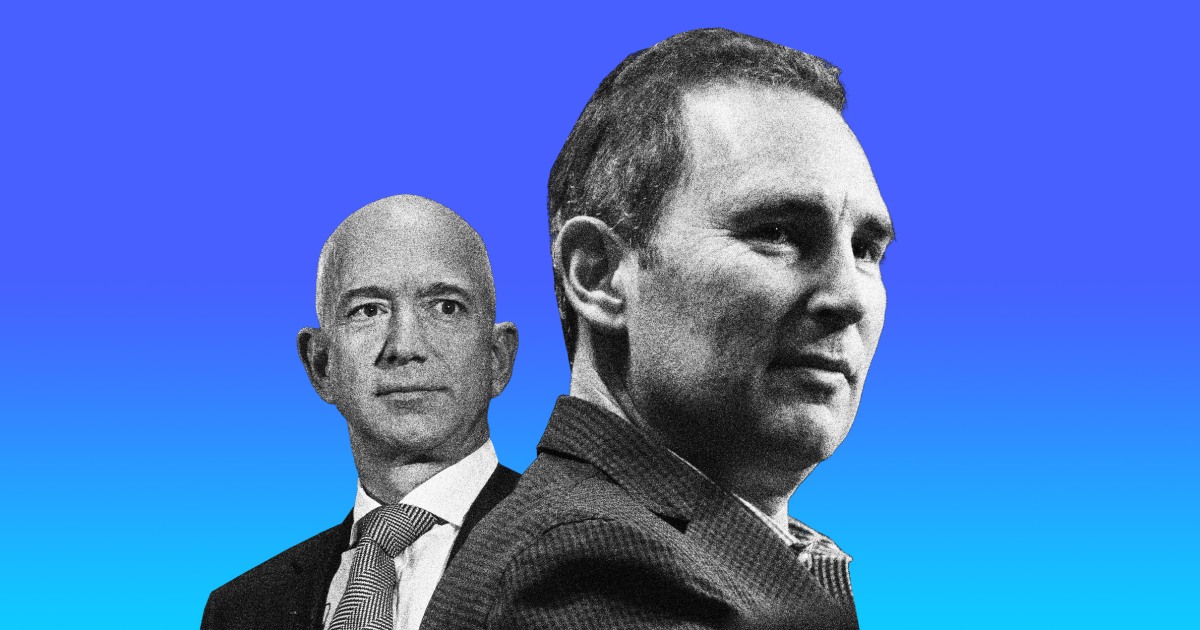
As Amazon CEO Jeff Bezos prepares to leave the planet in the coming weeks in a rocket built by his spaceship company, he’s handing the reins of his e-commerce business — and the country’s second-largest employer — to Andy Jassy, 53, a loyal lieutenant who spent 24 years by Bezos’ side.
Jassy, the former head of Amazon Web Services, begins his first day as Amazon’s new CEO on Monday. He has been with Amazon since 1997, just three years after Bezos founded what was then an online book store, from his home in a Seattle suburb on July 5, 1994.
The business has since ballooned into one of the most powerful companies in the world, alongside oil giant Saudi Aramco and tech monolith Apple, with a valuation of about $1.8 trillion. It has also propelled Bezos to the top of the list of world’s richest men, and made him one of just eight centibillionaires in the world, with a personal fortune of close to $200 billion.
With over 1.3 million employees worldwide and $386 billion in revenue last year, leading Amazon would ordinarily be a daunting challenge for anyone. Business is booming — but so is scrutiny of the company, as the online giant faces a slew of regulatory obstacles and unionization efforts that would test the mettle of any CEO.
“It’s very important to have a company be larger than the charismatic or well-known celebrity CEO,” said Barbara Kahn, a professor of marketing at the Wharton School of Business at the University of Pennsylvania. “Having a very good succession plan is absolutely relevant for the longevity of a company.”
While Jassy can anticipate serious regulatory hurdles from Congress and the Federal Trade Commission in the coming months, Bezos has built a formidable team to support him. Amazon spent nearly $19 million on lobbying in 2020, second only to Facebook when it comes to the country’s biggest corporate lobbyists, according to analysis from Public Citizen, a watchdog group that tracks spending in politics.
Jassy will also have to navigate the unions and workers who are attempting to organize Amazon’s massive delivery and logistics workforce while the company’s online retail division continues to grow at a breakneck pace. Amazon is expected to make up about 40 percent of all U.S. e-commerce sales by the end of the year.
That’s all in addition to the company’s booming online advertising business; the streaming social and gaming network Twitch, which Amazon owns; its Whole Foods grocery division; Amazon Prime’s video streaming and entertainment production arm, which now rivals Netflix; and the company’s growing interest in opening brick and mortar retail businesses — like its first Amazon Salon, which opened in London earlier this year.
“Amazon is a complex web of businesses that are very intricately linked together,” said Sunil Gupta, a professor at Harvard Business School, where Jassy received his MBA.
“Amazon Studios and streaming helps it keep the Prime subscriptions, which helps drive its ecommerce business. To manage the complexity of the business and break these silos, you need a CEO that can hold it all together,” Gupta said.
Regulatory battles
Last month, the House Judiciary Committee voted to advance a suite of six antitrust bills that aim to curtail the power and size of big tech companies. One of the bills, if passed, would strengthen antitrust agencies by collecting additional fees on some mergers. Another would restrict companies like Amazon from competing with other sellers on its own marketplace, meaning Amazon would be barred from selling its own brand of phone chargers on Amazon, or Apple would be prevented from selling its own apps in the App Store.
The bills are a result of a 16-month bipartisan investigation by the antitrust subcommittee of the Judiciary Committee. Still, Brian Huseman, the vice president of public policy at Amazon, said in a statement that the bills were pushed forward too quickly. “More than a half million American small- and medium-sized businesses make a living via Amazon’s marketplace, and without access to Amazon’s customers, it will be much harder for these third-party sellers to create awareness for their business and earn a comparable income,” Huseman said.
These bills, which are in part sparked by Amazon’s business practices, are poised to fundamentally rewrite U.S. antitrust laws. Jassy has some experience working with government agencies as Amazon Web Services rose to become a prominent military and government contractor, but antitrust policy is likely new terrain.
The Federal Trade Commission’s new chairwoman, Lina Khan, has also spent a significant part of her academic career studying and critiquing how Amazon’s dominance has harmed new markets. The agency is currently investigating Amazon and will likely review its proposed acquisition of MGM, the Hollywood TV and movie studio. Amazon filed a petition last week asking Kahn to recuse herself from antitrust cases that impact Amazon because of her prior work.
The bills and regulatory scrutiny could also lead to antitrust hearings for Amazon, which in the past have been time consuming for CEOs of technology companies, Gupta said, pointing to the hearings Bill Gates weathered when Microsoft was sued by the Justice Department for alleged monopoly practices 20 years ago.
Unionization efforts
Jassy will also have to contend with the massive workforce that powers and undergirds its e-commerce empire and has attracted the attention of major unions, including the Teamsters, one of America’s largest labor unions. The Teamsters last month shared plans to launch a nationwide unionization effort at Amazon warehouses.
Workers have long alleged grueling and unsafe labor conditions in Amazon’s warehouses, and Amazon currently has a roughly 150 percent rate of turnover among its warehouse employees. Under Bezos, Amazon aggressively fought worker organizing for nearly a decade. The company successfully opposed a major unionization effort in Bessemer, Alabama, earlier this year by hiring outside firms to assist the company in quashing the union drive. The outcome of the vote is currently being challenged, and the National Labor Relations Board held a hearing last month where workers detailed alleged retaliation for holding pro-union views.
Amazon’s director of media relations, Kelly Nantel, said in a statement that the union is not accepting the decision by workers and instead “seems determined to continue misrepresenting the facts in order to drive its own agenda.”
In a recent letter to shareholders, Bezos remarked on the union effort and said the company needs to do a better job ensuring its employees are successful. “We have always wanted to be Earth’s most customer-centric company,” his letter read. Now, he said, that vision should be expanded. “We are going to be Earth’s best employer and Earth’s safest place to work.”
Marketplace problems
Jassy will also need to deal with disgruntled sellers on its marketplace, experts say, where the company has been accused of culling data from third-party sellers on its platform, which it then uses to make its own version of the same product, according to Sucharita Kodali, a vice president and principal analyst at Forrester research firm. While some may dismiss the antitrust bills as misguided, citing grocery stores who have sold their own labels of goods for years, Kodali says it’s more complicated.
“It’s one thing if you’re a company like Procter and Gamble and Amazon knocks you off, but when you’re a small business and you have to sell on Amazon because it’s your biggest marketplace and they knock you off, it’s a different equation,” Kodali said.
Amazon says it doesn’t use data from specific sellers to inform its own brands. “Like all retailers, we are able to see what sells in our store, but we strictly prohibit employees from using non-public, seller-specific data to determine which private label products to launch,” Nell Rona, an Amazon spokesperson, told NBC News. Amazon-owned brands “make up a very small portion — around 1 percent of sales in our store,” Rona added.
Kodali added that Amazon appears to also inflate the ratings on its own products, which customers then routinely use to decide whether or not to make a purchase.
Dharmesh Mehta, vice president of customer trust at Amazon, said in a statement the company removed more than 200 million suspected fake reviews in 2020, and takes its “responsibility to monitor and enforce our policies seriously.”
Non-founder CEOs
From an investor perspective, Jassy may find it difficult to maintain the consistent growth Amazon saw under Bezos, its founder. Except for one or two quarters, Amazon has grown about 20 percent every quarter, Gupta said.
When tech companies move from being run by the founder to being run by a long-time executive, there can be a transitional period where the new chief will have to gain the trust of his workers and of the broader public. Gupta pointed to Tim Cook, who took over as CEO from Steve Jobs, one of Apple’s founders who built a cult-like persona around him.
“Everybody predicted that Apple would not be Apple anymore. And in all fairness it took Tim Cook a little bit to adjust, and people criticized that Apple didn’t have much innovation. But the company is firing on all cylinders now and he’s found his groove,” Gupta said.
Considering Jassy has been with Amazon for a quarter-century and grown Amazon Web Services into one of the most important internet infrastructure companies in the world, serving customers from Netflix to NASA, experts who watch Amazon closely say Jassy is a smart pick to take over from Bezos, and well poised to maintain the momentum of Amazon’s growth. About 63 percent of the company’s operating profits last year can be attributed to AWS, up nearly 30 percent over the previous year, according to the company’s financial statements.
“The successor is a very wise choice. Jassy is the one that started AWS, which is the profitable arm of Amazon,” said Kahn of the University of Pennsylvania. “While the retail portion of Amazon might generate a lot of revenue, it doesn’t generate the profits. I don’t think that’s lost on anyone.”
Source: | This article originally belongs to Nbcnews.com








